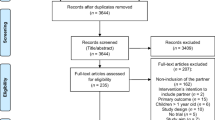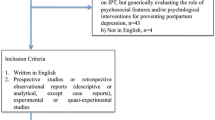Abstract
Researchers and clinicians agree that the quality of a woman's relationship with her partner consistently affects the severity, course, and risk of relapse of postpartum depression (PPD). However, there have been relatively few attempts to develop and evaluate the effectiveness of couple psychotherapy for women simultaneously experiencing PPD and relationship distress. This article introduces a newly developed interpersonal psychotherapy conjoint approach to treating PPD in the context of relationship distress. A case study illustrating the successful application of this approach is presented.
Similar content being viewed by others
References
Barbato A, D’Avanco B (2008) Efficacy of couple therapy as a treatment for depression: a meta-analysis. Psychiatr Q 79:121–132
Barnett B, Lockhart K, Bernard D et al (1993) Mood disorders among mothers of infants admitted to a mothercraft hospital. J Paediatr Child Health 29:270–275
Beach SRH, O’Leary KD (1992) Treating depression in the context of marital discord: outcome and predictors of response for marital therapy versus cognitive therapy. Beh Ther 23:507–528
Beck CT (2001) Predictors of postpartum depression: an update. Nurs Res 50:275–285
Boyce P, Harris M, Silove D et al (1998) Psychosocial factors associated with depression: a study of socially disadvantaged women with young children. J Nerv Ment Dis 186:3–11
Campbell SB, Cohn JF, Flanagan C et al (1992) Course and correlates of postpartum depression during the transition to parenthood. Dev Psychopathol 4:29–47
Cox AD, Puckering C, Pound A, Mills M (1987) The impact of maternal depression in young children. J Child Psychol Psychiatry 28:917–928
de Mello MF, de Jesus MJ, Bacaltchuk J, Verdeli H, Neugebauer R (2005) A systematic review of research findings on the efficacy of interpersonal therapy for depressive disorders. Eur Arch Psychiatry Clin Neurosci 255:75–82
Emanuels-Zuurveen L, Emmelkamp PM (1996) Spouse-aided therapy with depressed patients. Beh Mod 21:62–77
Fisher JR, Feekery CJ, Rowe-Murray HJ (2002) Nature, severity and correlates of psychological distress in women admitted to a private mother-baby unit. J Pediatr Child Health 38:140–145
Foley SH, Rounsaville BJ, Weissman MM et al (1989) Individual versus conjoint interpersonal psychotherapy for depressed patients with marital disputes. Int J Fam Psychiatr 10:29–42
Gilliam CM, Rocco Cottone R (2005) Couple or individual therapy for the treatment of depression: an update of the empirical literature. Am J Fam Ther 33:265–272
Gupta M, Coyne JC, Beach SRH (2003) Couples treatment for major depression: critique of the literature and suggestions for some different directions. J Fam Ther 25:317–346
Jacobson NS, Dobson K, Fruzzetti AE et al (1991) Marital therapy as a treatment for depression. J Consult Clin Psychol 59:547–557
Klerman TB, Weissman MM (1993) New applications of interpersonal psychotherapy DC: American Psychiatric Press
Marks M, Wieck A, Checkley S et al (1996) How does marriage protect women with histories of affective disorder from post-partum relapse? Br J Med Psychol 69:329–342
Matthey S, Kavanagh DJ, Howie P et al (2004) Prevention of postnatal distress or depression: an evaluation of an intervention at preparation of parenthood classes. J Affect Disord 79:113–126
Misri S, Kostaras X, Fox D et al (2000) The impact of partner support in the treatment of postpartum depression. Can J Psychiatry 45:554–558
Morinaga K, Yamauchi T (2003) Childbirth and changes of women’s social support network and mental health. Shinrigaku Kenkyu 74:412–419
O’Hara MW, Stuart S, Gorman L et al (2000) Efficacy of interpersonal psychotherapy for postpartum depression. Arch Gen Psychiatry 57:1039–1045
Patel V, Rodrigues M, DeSouza N (2002) Gender, poverty, and postnatal depression: a study of mothers in Goa. India Am J Psychiatry 159:43–47
Schulz MS, Cowan CP, Cowan PA (2006) Promoting healthy beginnings: a randomized controlled trial of a preventive intervention to preserve marital quality during the transition to parenthood. J Consult Clin Psychol 74:20–31
Spanier G (1976) Measuring dyadic adjustment: new scales for assessing the quality of marriage and similar dyads. J Mar Fam Ther 38:15–30
Spinelli MG, Endicott J (2003) Controlled clinical trial of interpersonal psychotherapy versus parenting education program for depressed women. Am J Psychiatry 160:555–562
Stuart S, O’Hara MW (1995) Interpersonal psychotherapy for postpartum depression: a treatment program. J Psychother Pract Res 4:18–29
Stuart S, Robertson M (2003) Interpersonal psychotherapy: a clinician's guide. Edward Arnold, London
Viinamaki H, Niskanen L, Pesonen P, Saarikoski S (1997) Evolution of postpartum mental health. J Psychosom Obstet Gynecol 18:213–219
Weissman MM, Markowitz JC, Klerman GL (2000) Comprehensive guide to interpersonal psychotherapy. Basic Books, New York
Wilfley D, Weissman MM, Ayres VE (2000) Interpersonal psychotherapy for group. Basic Books, New York
Zlotnick C, Miller IW, Pearlstein T et al (2006) A preventive intervention for pregnant women on public assistance at risk for postpartum depression. Am J Psychiatry 163:1443–1445
Author information
Authors and Affiliations
Corresponding author
Rights and permissions
About this article
Cite this article
Carter, W., Grigoriadis, S. & Ross, L.E. Relationship distress and depression in postpartum women: literature review and introduction of a conjoint interpersonal psychotherapy intervention. Arch Womens Ment Health 13, 279–284 (2010). https://doi.org/10.1007/s00737-009-0136-8
Received:
Accepted:
Published:
Issue Date:
DOI: https://doi.org/10.1007/s00737-009-0136-8




